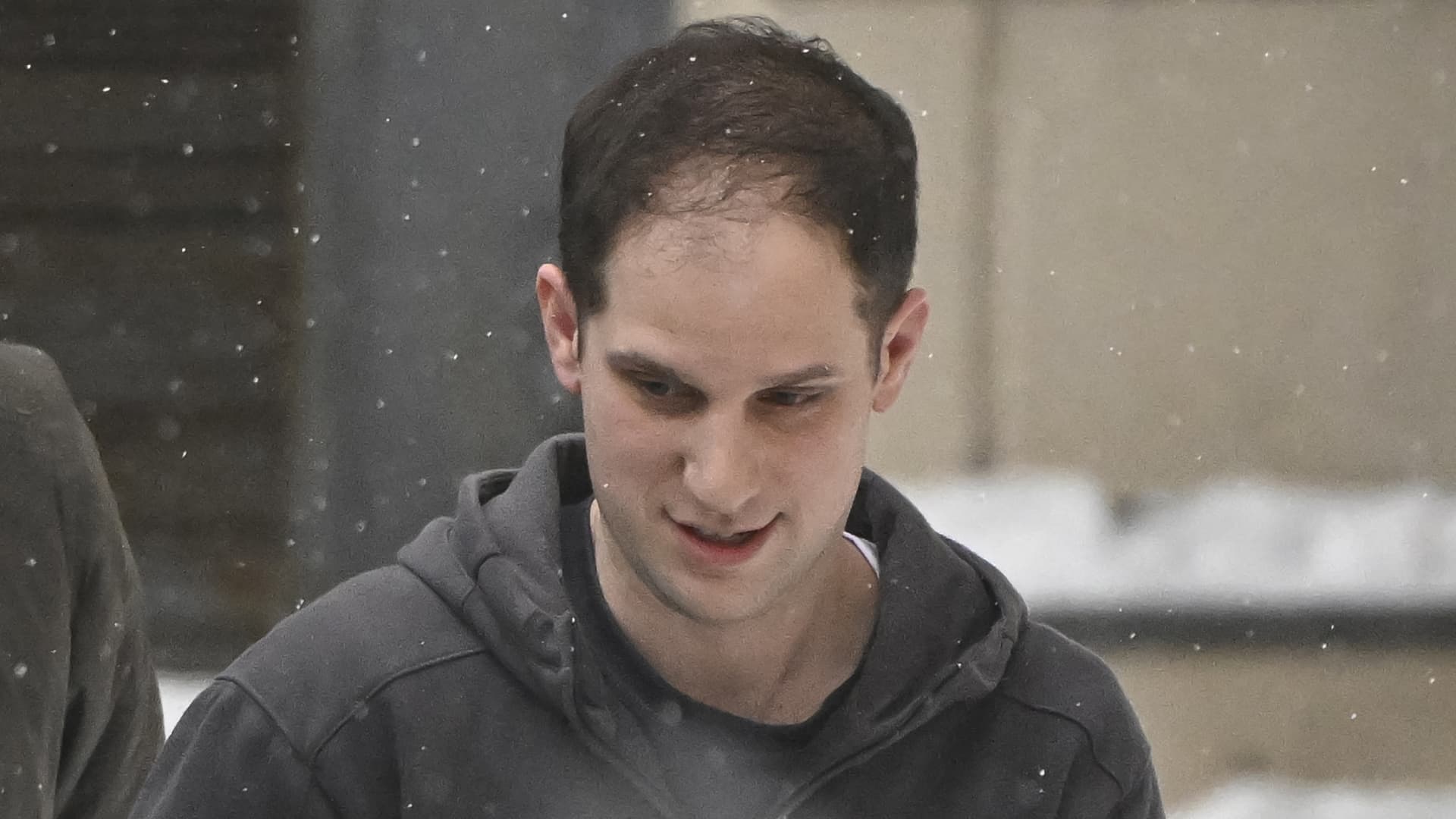Russian President Vladimir Putin said “an agreement can be reached” over the release of detained Wall Street Journal reporter Evan Gershkovich, signaling he is open to an exchange for a Russian prisoner serving time in Germany.
Putin’s comments Tuesday were translated by the team of former Fox News journalist Tucker Carlson, who carried out the Kremlin leader’s first interview with the Western media since Moscow’s invasion of Ukraine in 2022. The sprawling two-hour exchange, which was published Thursday, also covered Putin’s views on history, the origins of the war in Ukraine, geopolitics and artificial intelligence.
Putin did not outright solicit a swap, but indirectly compared the case of 32-year-old Gershkovich with that of “a person serving a sentence in an allied country of the U.S” who “due to patriotic sentiments, eliminated a bandit in one of the European capitals.”
This is a likely reference to Vadim Krasikov, a Russian hit man who was convicted by a German court for killing former Chechen dissident Zelimkhan Khangoshvili with several close-range shots in Berlin in August 2019.
In Krasikov’s indictment, the German prosecution concluded the crime was “committed on behalf of state authorities of the Russian Federation,” according to a Google-translated statement.
“Whether he did it of his own volition or not. That is a different question,” Putin said Thursday of the unnamed killer.
“At the end of the day, it does not make any sense to keep [Gershkovich] in prison in Russia. We want the U.S. special services to think about how they can contribute to achieving the goals our special services are pursuing. We are ready to talk,” Putin said, repeatedly indicating that negotiations over the journalist’s future were underway.
The Journal strongly denies the charges of espionage levied against Gershkovich, a Russia correspondent at the paper, and says he was in Yekaterinburg on a legitimate reporting trip before he was imprisoned in March 2023.
Washington and Moscow are no strangers to prisoner exchanges. In December 2022, American professional basketball player Brittney Griner, who was convicted in Russia for smuggling drugs, was freed in exchange for Viktor Bout, a Russian arms dealer who was arrested in Thailand and extradited to the U.S.
“Evan Gershkovich never should have been detained in the first place. Russia should immediately release Evan and Paul Whelan,” a U.S. State Department spokesperson told CNBC by email. Whelan is a former U.S. Marine who was imprisoned in Russia on espionage charges and sentenced to 16 years in jail in 2020.
Germany’s Ministry of Foreign Affairs did not immediately respond to a CNBC request for comment on whether Berlin would be amenable to a prisoner swap deal.
Putin maintains that Gershkovich, whose pretrial custody was extended by two months in late January, was caught “red-handed” in the process of receiving confidential intelligence in a “conspiratorial manner.” The Russian president on Thursday admitted that he does not know what agency the journalist was allegedly working for.
“He was receiving classified, confidential information, and he did it covertly. Maybe he did that out of carelessness or his own initiative,” Putin added.
The Journal has repeatedly insisted that Gershkovich has not broken the law.
“Evan is a journalist, and journalism is not a crime. Any portrayal to the contrary is total fiction. Evan was unjustly arrested and has been wrongfully detained by Russia for nearly a year for doing his job, and we continue to demand his immediate release,” the newspaper said in response to Putin’s comments.
“We’re encouraged to see Russia’s desire for a deal that brings Evan home, and we hope this will lead to his rapid release and return to his family and our newsroom.”
Gershkovich is not the only journalist with U.S. ties facing the punitive ire of the Kremlin’s justice system. Earlier this month, a Russian court prolonged the pretrial detention of Russian-American citizen Alsu Kurmasheva, a reporter for Radio Free Europe/Radio Liberty, on charges of violating a law on “foreign agents,” according to Reuters.
Moscow has cracked down decisively on journalists through a spate of wartime censorship laws introduced shortly after Russia’s invasion of Ukraine. Current policies criminalize discrediting the Russian army or deliberate disinformation about the war. Several Western news outlets have closed local bureaus and withdrawn their reporters from Russia as a result, citing safety concerns.
Correction: Russian President Vladimir Putin made his comments Tuesday. An earlier version misstated the day.





